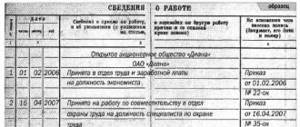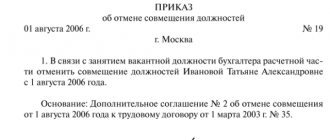Contrary to popular stereotypes, the work of a civil servant is not always highly paid. And often it is the need to increase their income that makes civil servants think about additional income.
In addition, every person is interested in trying himself in a slightly different type of activity than the one he is used to doing. These and other factors lead to the fact that even high-ranking officials are thinking about working part-time. But how possible is this for them? And if possible, what restrictions are imposed on additional employment?
Can a civil servant have a part-time job?
According to Federal Law No. 79 of July 27, 2004, in principle he has the right to work part-time, although it is limited. There are only two restrictions, albeit significant:
- It is important that the new job does not take more than 4 hours during the day
- Did not create a conflict of interest with an existing position.
What is a conflict of interest?
The work of every government organization, both municipal and federal, is monitored by an anti-corruption commission. When submitting a request for permission to work part-time, a municipal employee must be guided by the decision made by the commission. Only if she gives the go-ahead will it be possible to get a part-time job.
In addition, for employees, especially municipal ones, there are a number of activities where the law a priori assumes a conflict of interest.
For example, if you try to combine work in two different government bodies, the commission’s conclusion will most likely be negative, although there is no legal prohibition on such combination. This is usually explained by the fact that both positions are too responsible to treat at least one of them as a part-time job.
When considering employment, you should understand that part-time work and combining positions are far from the same thing.
Nothing prevents a civil servant from combining two or more positions in one institution. In particular, he can replace a colleague who is temporarily absent from work due to vacation, illness, etc. Such combination for an official is regulated by Article 60.2 of the Labor Code of the Russian Federation, as for any other employee.
Types of part-time jobs
Multiple positions can be internal and external. Internal part-time work should not be confused with combination. Combination involves working in two or more positions in one institution.
Part-time work is employment in two jobs, which involve performing different functions. If these jobs are located in the same institution, then this is internal part-time work. External part-time work involves working in different organizations.
The fundamental difference between internal and external part-time work is the procedure for making an entry about additional work in the work book. To implement it with external part-time work, you must submit an application to the employer at the second job with a supporting document. For internal part-time jobs, a simple statement is enough.
As for combination, Art. 60.2 of the Labor Code allows civil servants to combine positions within the established working hours. Combination is possible only with the written consent of the employee. Employment in two positions in case of combination does not require the conclusion of a new employment contract and can be carried out free of charge, therefore this type of employment relationship should be approached with the utmost care.
The main differences between part-time and part-time jobs are shown in the table:
| Criteria | Part-time job | Combination |
| Place of employment | at different jobs in one or more institutions | in different positions in the same institution |
| Employment contract | is | does not consist |
| Labor guarantees | all guarantees established by labor legislation are provided (vacation, rest, sick leave, bonuses) | no additional guarantees are provided for the new position |
| Payment | is mandatory | may not be implemented |
How to calculate the number of vacation days and not make a mistake. You will learn how to receive sufficient maternity benefits. The correct algorithm for obtaining and processing your sick leave is here!
Areas of activity
Federal Law No. 25 clearly prohibits municipal employees from holding part-time positions:
- in the administrative apparatus;
- on supervisory and trustee boards;
- in any of the structural divisions of a non-profit organization or foreign company.
In the case where a municipal employee heads the local administration, the law limits his part-time activities only to the areas of teaching, creativity and science.
Part-time work for civil servants from the point of view of labor legislation
Issues related to the performance of labor activities by civil servants are enshrined in Federal Law No. 79-FZ “On Civil Service” dated July 27, 2004. According to this legal act, a person working in this field has the right to work part-time, but with a number of conditions and restrictions. This rule also applies to municipal employees, whose labor activities are regulated by Federal Law No. 25-FZ of March 2, 2007.
According to Article 14 of Federal Law No. 79-FZ, persons carrying out labor activities in the field of state civil service have the right to find employment in other jobs during their free time from their main duties. To do this, they need to notify their employer of this desire in advance.
The employer has the right to refuse this request only if the proposed part-time job may entail a conflict of interest. This concept means that the implementation of job functions at an additional place of work will cause a deterioration in the quality of performance of duties at the main one. If an employee disagrees with such a decision, he has the right to appeal it in court.
Notification of intention to take part-time employment may be considered not only by the employer, but also by the anti-corruption commission. She reviews the employee's application for several days. After this, the worker is notified of the decision. If the refusal to satisfy the employee’s request was made by this body, then it will not be possible to appeal it.
Since a reduced working week is not established for civil servants, they can work part-time for no more than 20 hours. The maximum duration of a daily shift is 4 hours, provided that on that day the employee worked at his main place. If on this day he did not perform his main duties, then this indicator can be increased to 8 hours.
For example, citizen Petrov is a civil servant and received permission to work part-time. Secondary work involves performing job duties on weekends (Saturday and Sunday) for 8 hours and two hours after the main job on weekdays.
In sum, the total number of working hours per week is: 8*2+5*2=26. With this schedule, the maximum permissible shift duration per week will be exceeded by 6 hours. In this regard, it is necessary to change the schedule so as to reduce the total working hours by the specified number.
Combination restrictions
Federal Law “On Civil Service” No. 79-FZ establishes a ban on part-time work for persons holding a number of positions. These include:
- Heads of institutions;
- Elected positions in local government bodies;
- Positions in a trade union organization that involve receiving wages at a given place.
According to Article 17 of Federal Law No. 79-FZ, civil servants are not allowed to organize enterprises whose purpose is to make a profit. They are prohibited from becoming co-founders of such organizations personally or through proxies, as well as from acquiring securities on which profit can be made in cases provided for by this regulatory legal act.
These categories of civil servants are not prohibited from carrying out scientific, creative and teaching activities.
Part-time work, according to Article 60.1 of the Labor Code of the Russian Federation, can be of two types:
- Internal – involves employment for another position within the same enterprise.
- External – involves concluding an employment agreement with another employer, outside the main place of work.
In both cases, it is mandatory for the parties to sign an employment contract. In the current legislation there is another concept that is similar in meaning - combination. It involves assigning the duties of another position within the same enterprise to an employee.
A distinctive feature between combining positions and internal part-time work is that in the first case, additional work is carried out. official duties occurs in the process of carrying out the main activity. Also, it is not necessary to draw up an employment contract; the employee’s consent to perform the duties of another position and the execution of an agreement between the parties is sufficient.
Internal and external part-time work also has a number of distinctive features. In particular, they relate to the procedure for registering such work and making an appropriate entry in the work record.
In the first case, when an employee enters into an additional contract with the same employer, the personnel department immediately makes a corresponding entry in the labor record, which is in their custody.
If an employee has found a part-time job outside of his main place of work, then after signing the necessary papers he must receive a certificate of part-time employment. He must transfer it to the main place of work, where the necessary recording will be made.
When concluding an employment contract at a secondary workplace, this document must necessarily contain an indication that the work activity is carried out part-time.
Notice of employment of a municipal employee
Article 64.1 of the Labor Code of the Russian Federation assigns to the employer the obligation, when concluding an agreement with a citizen who was in the public service, to notify the relevant official institution about this. However, this applies exclusively to former civil servants. This legislative provision does not currently apply to employees working in government agencies.
As for the employee himself, before applying for a part-time job, he is obliged to write an application to the anti-corruption commission that oversees his main activities. The application is written on a standard form addressed to the head of the government agency. Just below in the “header” the full name and position of the applicant are indicated. The application itself contains a request to consider the issue related to part-time employment. Then the future position and the name of the organization where the applicant wants to work are written. At the very bottom there is a date and signature.
It is noteworthy that neither the Labor Code of the Russian Federation nor any Federal Law require, when applying for a part-time job, the presentation of a document confirming the consent of the main employer.
Decor
It’s worth clarifying right away that part-time work can be internal (work at one company) and external (additional position in another company). In both the first and second cases, another employment contract is drawn up, only it indicates that the position is occupied part-time and is not the main one. The procedure for registering civil service employees is as follows:
- The employee submits an application to the anti-corruption company. The application sets out the desire for an additional position in the same organization and some other one.
- If the commission gives its consent, the employee takes a copy of the work record book and signs an employment contract.
- Work is performed according to obligations and hourly standards - no more than four hours per day and no more than 20 hours per week.
Government employees have the same rights to benefits as other employees. These include annual and additional leave. It is provided in the same order, the nuances are not provided here.
Can a municipal employee or employee of government agencies act as a part-time worker? Yes, this is allowed. However, there are some nuances and limitations here. One of them is obtaining permission for an additional position. In all other respects, everything happens exactly the same as in the case of other employees:
- The work should not take place in parallel with the main activity.
- Working hours – no more than 4 hours a day.
- It is necessary to sign an employment contract, even if the position is provided in the same organization.
- The employee has all the same rights and responsibilities as in the main position.
- The employee can terminate the employment contract at any time he wishes. The only thing is that you need to notify the manager two weeks in advance.
- If the contract is fixed-term, then the manager does not have the right to dismiss the employee until the term of this contract expires.
- A municipal employee has the right to go on maternity leave or sick leave if necessary.
As you can see, the requirements here are exactly the same as for other workers. The only thing is that a government employee may simply not be allowed to work at another enterprise, since his desire alone is not enough for this.
Salary
It is important to understand that in his second job, a civil servant enjoys all the benefits and rights that are provided for other civilians. The amount and procedure for remuneration for his work in a budgetary institution are fully regulated by an agreement with the employer and the Labor Code of the Russian Federation. On exactly the same grounds, a civil servant enjoys all the rights guaranteed by labor legislation, including the right to receive annual and additional paid leave.
Is it possible for a civil service manager to work part-time?
- Internal – involves employment for another position within the same enterprise.
- External – involves concluding an employment agreement with another employer, outside the main place of work.
In both cases, it is mandatory for the parties to sign an employment contract. In the current legislation there is another concept that is similar in meaning - combination. It involves assigning the duties of another position within the same enterprise to an employee.
A distinctive feature between combining positions and internal part-time work is that in the first case, additional work is carried out. official duties occurs in the process of carrying out the main activity.
Is it possible for employees of the Ministry of Internal Affairs to combine positions?
In accordance with Federal Law No. 342 of November 30, 2011, as amended on April 3, 2021, employees of the Department of Internal Affairs and the Ministry of Internal Affairs cannot work part-time. The exception is scientific, pedagogical or other creative activities that do not cause a conflict of interest with the main profession.
In addition, such activities should not prevent an employee of these bodies from performing his basic duties provided for by law. At the same time, it is not allowed for this part-time work to be fully financed by foreign or international organizations, as well as stateless persons. The employee’s immediate supervisor must be notified of such activities.
At the same time, the law does not prohibit an employee of the Department of Internal Affairs or the Ministry of Internal Affairs from combining two or more positions in the same bodies, unless there is a conflict of interest.
It can be concluded that the employment of a civil servant in most cases is regulated not so much by legislative acts as by the decision of management and the anti-corruption commission.
And if this is a negative decision, then it is usually very difficult to challenge it. In case of refusal to allow him to hold a particular position part-time, the civil servant has the right to sue the boss and the commission, but he has little chance of winning such a case. In contact with
Normative base
In accordance with the provisions of Law No. 79-F3 “On the State Civil Service of the Russian Federation” of 2004, a person employed in the civil service has the right to work part-time.
The same applies to municipal employees, whose activities are regulated by the Law on Municipal Service.
The text of these documents can be found here:
Federal Law on State Civil Service
Federal Law on municipal service
How to use the resource
Answer : A state civil servant has the right to carry out part-time work in a commercial organization, if this does not entail a conflict of interest and this activity is not related to the management of a commercial organization. The civil servant must first notify the employer's representative about such part-time work.
Question: Is it possible for a municipal employee (head of a city administration department) to work part-time as a teacher before lunch at a school, and in the afternoon in the administration itself, and so on for four years? According to the law, it seems to be impossible, but it works. Maybe the head of the administration has the right, by some order, to allow this combination. Please answer the question.
Features and Limitations
A civil servant of any category is prohibited at the legislative level from working part-time in a job that is related to generating income from business. In practice, this means that he cannot engage in entrepreneurial activity in any type of business. This restriction also applies to business abroad. According to the law, an official who violates this prohibition may be dismissed.
Read more: Purchase of a land plot under a real estate property
How else can a civil servant earn money?
A civil servant can receive income from activities other than serving for the benefit of the Motherland. As long as it doesn't have commercial implications.
Another useful article: How to rent out housing for self-employed people
Civil servants, on an equal basis with other citizens, can receive income from the following types of activities:
- teaching;
- research;
- scientific.
This list is exhaustive and is not subject to further interpretation.
Thus, a civil servant can engage in independent research, summarize it in an article or book, and receive a reward for selling it. Or he can work at a university as a part-time teacher (for example, a legal adviser at the Internal Affairs Directorate can give lectures on law).
By engaging in such activities, it will be possible to declare income as an individual and pay a tax of 13%.
The question arises: is it possible to register as self-employed, engage in non-prohibited activities and pay less taxes?
Unfortunately no. As mentioned above, restrictions on the types of activities are imposed on a civil servant, and any activity as a self-employed person (with the exception of leasing real estate) is treated as commercial.
So, combining the work of a civil servant and self-employment is possible only in one specifically indicated case: if the official rents out housing and receives income from it. However, if additional income is needed, the civil servant can engage in other permitted activities. For example, teaching or research. But not as a self-employed person, but under a regular employment contract.
(Visited 498 times, 5 visits today)
Self-employed in the Russian Federation
Self-employedv.rf is an information portal for self-employed people. Relevant and interesting information, answers to important questions and solutions to non-standard problems of the self-employed.
Related Posts
- Analysis of the law on self-employed: everything you wanted to know
- Self-employment: the pitfalls of working for yourself
- Who is a self-employed person and how does his status differ from others?
- Can a self-employed person work under an employment contract?
- How self-employed people can use the “My Tax” program and why...
- What a self-employed person can do: a complete list of activities
- Is it worth becoming self-employed: the pros and cons of self-employment
- How to rent out housing for self-employed people
Is it possible to earn extra money while in the civil service?
Question: Hello! I have the following question for you. I have a permanent job in a design bureau and in two organizations I work part-time as an engineer. In all three organizations I am registered officially, the work book is kept at the main place of work (design bureau) and there are no records of combined work in it. Now I am changing my main place of work to the civil government service. So, in accordance with the law on civil service, are my part-time jobs subject to a ban? Do I have the right to continue working there officially (these jobs are not related to commercial activities)? The civil service told me that it seems to be impossible and can only be done under a contract for work performed. In the law on civil service of the Voronezh region No. 29 OZ adopted on May 26, 2005 (as amended on May 12, 2009), I did not find a section with restrictions for civil servants at all. Please clarify my situation.
More to read: Oryol Region Contaminated by Chernobyl
Answer: In accordance with the Federal Law of July 27, 2004 N 79-FZ “On the State Civil Service of the Russian Federation” (as amended on February 2, 2006, March 2, April 12, December 1, 2007, March 29, July 23, December 25, 2008, July 17, 18, 2009) Federal laws, other regulatory legal acts of the Russian Federation, laws and other regulatory legal acts of the constituent entities of the Russian Federation containing labor law standards apply to relations related to the civil service , to the extent not regulated by this Federal Law.
Part-time work in the civil service, concept and procedure for implementation
A difficult financial situation, as well as individual circumstances characteristic of a civil servant, may become the basis for the latter’s desire to get another job with a different employer.
To ensure that a civil servant does not lose his existing place of employment, and is also not deprived of the opportunity to use the guarantees provided to him, it is necessary to familiarize himself with the list of basic legislative requirements that are associated with performing work in several jobs.
How does the legislator view part-time work?
The legislator does not limit the ability of a civil servant to exercise his labor rights. Thus, a civil servant can become a performer of labor functions for another employer only during the time that is free from his main place of employment.
The rule is established in the norms of federal legislation, namely Federal Law No. 79, which was adopted back in 2004.
The legislator has imposed on a civil servant who intends to start a part-time job one important duty, which is to inform the current employer in advance about the desire to carry out a part-time job.
The right to allow or refuse part-time work rests with the employer. In each specific case, the employee’s manager is obliged to consider the issue of conflict of interests between the existing place of work and the one that will be considered a part-time job. Only the absence of such a conflict can become the basis for a positive solution to the issue of part-time work.
In what cases is it prohibited?
All categories of civil servants are officially prohibited from holding positions directly related to receiving income from private business, therefore such persons cannot be private entrepreneurs.
In addition, as noted above, a civil servant working in a government agency cannot simultaneously work in another government agency.
How to get a part-time work book? Details are here.
Is there a part-time bonus? Read here.
Combination
Unlike part-time work, which may involve working at another enterprise, an employee has every right to perform other work for an employee who is temporarily absent from the workplace (maternity leave, annual leave, sick leave).
However, with regard to civil servants, there is no clear and unified regulation determining the legality of combining positions, and therefore one should be guided by the provisions of the Labor Code (Article 60.2).
This article provides for him to perform additional work within the established working hours.
For this purpose, the written consent of the employee must be taken.










